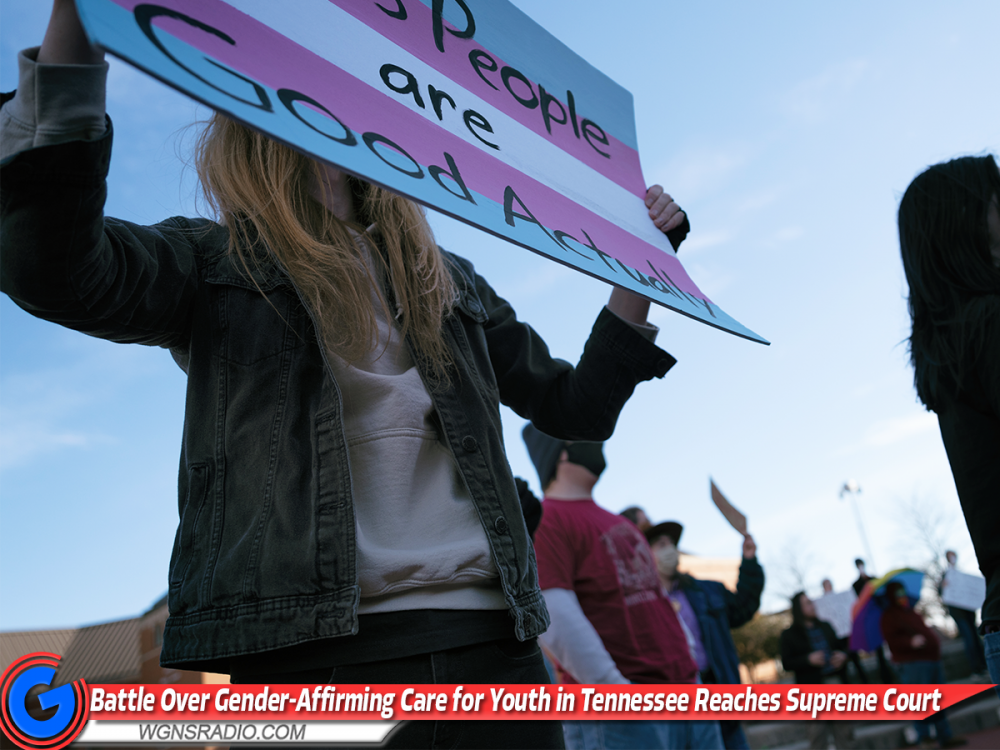WASHINGTON – The Supreme Court today held oral arguments in a landmark case brought by three families and a medical provider challenging a ban on gender-affirming hormonal therapies for transgender youth. The case, U.S. v. Skrmetti, began when the American Civil Liberties Union, the ACLU of Tennessee, Lambda Legal, and Akin Gump Strauss Hauer & Feld LLP filed an initial lawsuit on behalf of Samantha and Brian Williams of Nashville and their 16-year-old transgender daughter, alongside two other plaintiff families filing anonymously and Memphis-based physician Dr. Susan Lacy. The plaintiff families and Dr. Lacy argue that the law violates the Equal Protection rights of transgender adolescents. The United States has also intervened, contending that the Tennessee law violates the Equal Protection Clause of the 14th Amendment.
“Tennessee’s ban on gender-affirming medical care is an active threat to the future my daughter deserves,” said Brian Williams, father of 16-year-old L.W. and private plaintiff in U.S. v. Skrmetti. “It infringes not only on her freedom to be herself but on our family's love for her. We are not expecting everyone to understand everything about our family or the needs of transgender young people like our daughter. What we are asking for is for her freedom to be herself without fear. We are asking for her to be able to access the care she needs and enter adulthood knowing nothing is holding her back because of who she is.”
Oral arguments were presented by Chase Strangio, Co-Director of the ACLU’s LGBTQ & HIV Project. Strangio, a prominent advocate for transgender rights, has spearheaded legal strategies against numerous anti-transgender laws passed in state legislatures since 2016, including 12 legal challenges to state laws banning transgender youth from accessing gender-affirming medical care.
“My heart — and the heart of every transgender advocate fighting this fight — is heavy with the weight of what these laws mean for people’s everyday lives,” said Strangio. “But I also know that every out trans person has embraced the unknown in the name of living free from shame or the limits of other people’s expectations. By virtue of being a trans person, each of us has chosen hope over despair. And as all parents know, when your child is suffering, you are suffering. My heart aches for the parents who spent years watching their children in distress and eventually found relief in the medical care that Tennessee now overrides their judgment to ban. Whatever happens today, tomorrow, and in the months and years to come, I trust that we will come together to fight for the realized promise of our Constitution’s guarantee of equal protection for all.”
In its defense of the state’s ban, Tennessee Attorney General Jonathan Skrmetti urged the Supreme Court to expand its ruling in Dobbs v. Jackson Women’s Health Organization—a decision that overturned Roe v. Wade—to grant states broader authority to ban gender-affirming medical care. Tennessee’s defense asserts that the ban does not discriminate on the basis of sex, despite prohibiting minors of one sex from accessing medical care that is allowed for minors of another sex.
“Today, we made a persuasive and comprehensive argument to the Supreme Court underscoring the real and deep harm of Tennessee’s discriminatory ban on medical care for transgender youth, a ban unsupported by either science or law,” said Karen L. Loewy, senior counsel and director of Constitutional Law Practice for Lambda Legal. “And the harm of these bans would impact tens of thousands of transgender youth – and potentially transgender adults – across the country should the court fail to subject Tennessee’s ban to the kind of scrutiny warranted by its discriminatory terms. No court should be allowed to disregard the overwhelming evidence supporting both the safety and efficacy of this health care for transgender youth simply because a state legislature passed a mean-spirited bill. We look forward to this court understanding that a wholesale ban on treatments solely because they are prescribed to help transgender youth live as their authentic selves is discrimination, plain and simple. Politicians have no business interfering with health care decisions for transgender youth, particularly when they, their parents, and their doctors all agree on a medically necessary course of treatment.”
While the justices deliberated inside, hundreds of rally-goers gathered outside the courthouse to support the plaintiffs and the rights of transgender individuals. The “Freedom to Be” rally featured speakers ranging from transgender youth and supportive parents to civil rights leaders and faith advocates. Photography from the event is available for use, with credit to the American Civil Liberties Union.
“In this monumental and historic case, the U.S. Supreme Court has the opportunity to affirm the essential freedom and equality of all people before the law — including trans youth and their families,” said Lucas Cameron-Vaughn, staff attorney at the ACLU of Tennessee. “Every day this law inflicts further pain, injustice, and discrimination on families in Tennessee and prevents them from receiving the medical care they need. We ask the Supreme Court to commit to upholding the promises of the U.S. Constitution for all people by putting an end to Tennessee’s state-sanctioned discrimination against trans youth and their families. As we await further developments, we are committed to standing beside the brave families and doctor in this case as well as all transgender people in Tennessee, while continuing to seek equal access to justice and resisting further incursion into our freedoms by politicians seeking political gain.”
The Supreme Court granted a cert petition for the case in June 2024, later approving a motion to split argument time between the U.S. Solicitor General and attorneys for the private plaintiffs. Plaintiffs’ arguments were bolstered by amicus briefs from 20 state attorneys general, 164 members of Congress, leading medical organizations, bioethicists, and transgender individuals who began gender-affirming care as minors and are now thriving adults.
“This is no ordinary medical regulation,” said Pratik Shah, head of Supreme Court & appellate practice at Akin Gump. “Tennessee is categorically depriving transgender adolescents of care that they, their parents, their doctors, and expert bodies all recognize as vital to their health and well-being. Our Constitution does not countenance such targeting for failing to adhere to the state’s preferred gender norms. The Supreme Court shouldn’t either.”
Since 2021, 24 states have enacted categorical bans on gender-affirming medical care for transgender youth. Over 100,000 transgender minors now reside in states with such bans, with additional restrictions being proposed nationwide. A ruling in U.S. v. Skrmetti is expected by the spring or early summer of 2025.





